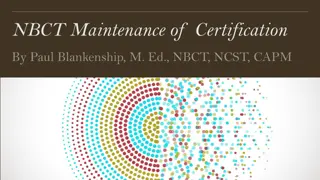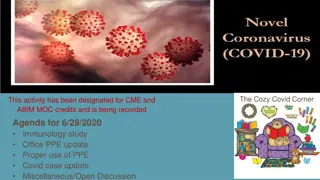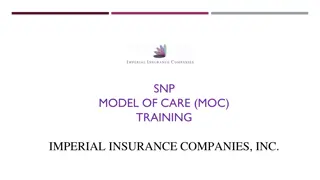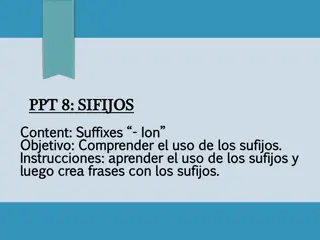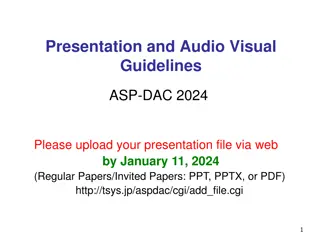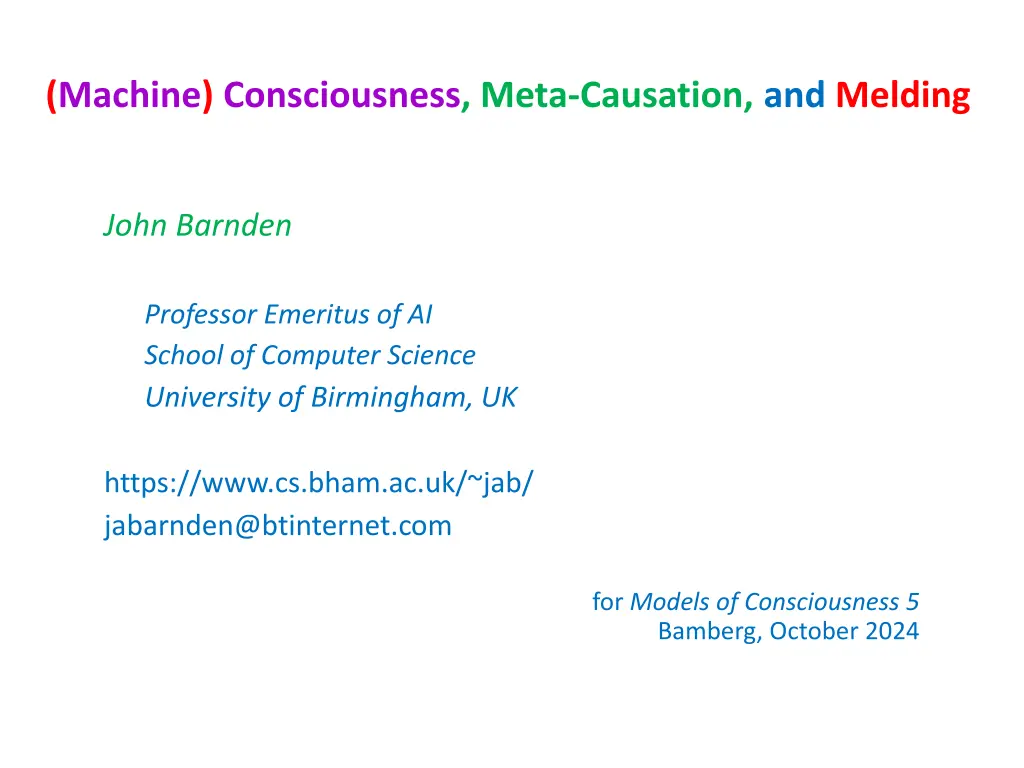
Understanding Meta-Causation in Consciousness Theories
Explore the concept of meta-causation in consciousness theories as discussed by John Barnden, delving into the crucial role it plays in understanding consciousness and the causative connections within trajectories. Discover the implications of meta-causation on machine consciousness, melding cognition, and affect in both artificial and natural consciousness.
Download Presentation

Please find below an Image/Link to download the presentation.
The content on the website is provided AS IS for your information and personal use only. It may not be sold, licensed, or shared on other websites without obtaining consent from the author. If you encounter any issues during the download, it is possible that the publisher has removed the file from their server.
You are allowed to download the files provided on this website for personal or commercial use, subject to the condition that they are used lawfully. All files are the property of their respective owners.
The content on the website is provided AS IS for your information and personal use only. It may not be sold, licensed, or shared on other websites without obtaining consent from the author.
E N D
Presentation Transcript
(Machine) Consciousness, Meta-Causation, and Melding John Barnden Professor Emeritus of AI School of Computer Science University of Birmingham, UK https://www.cs.bham.ac.uk/~jab/ jabarnden@btinternet.com for Models of Consciousness 5 Bamberg, October 2024
Plan of The Talk Brief points about METADYN, a recent theory of consciousness distinctively based on META-CAUSATION (higher-order causation). METADYN s mixed messages about machine consciousness. Initial thoughts (Work in Progress!) on benefits that METADYN s promises as regards the MELDING of consciousness, cognition & affect (emotion, pain, etc.) in machine consciousness OR natural consciousness. MELDING = strand (1) in Abstract. The talk largely leaves aside MIMICRY = the numerical simulation in strand (2) in Abstract.
Meta-Causation, intuitively The notion of meta-causation arises intuitively in (suitable meanings of) some sentences. Of course, they don t show meta-causation really exists. John made Sally cry, and this caused her mother to be angry. LEFT-HANDED meta-causation: [John s-CAUSING-Sally-to-cry] meta-caused her mother to be angry John forced Mary to make Bill go away. RIGHT-handed meta-causation: [Something John did] meta-caused [Sally s-CAUSING-Bill-to-go-away]. AMBIDEXTROUS meta-causation: left-handed AND right-handed: e.g. a causing meta-causes a causing. NB: the cause or effect side of a meta-causing can itself contain meta- causation.
MOTIVATION for thinking that Consciousness involves Meta-Causation [Barnden 2022 in Review of Philosophy & Psychology] [Barnden 2020 in Entropy] (incl. start of a mathematical framework) [Barnden 2014 in J. Consciousness Studies for initial steps]
Step 1: Causation within Trajectories is Crucial to Consciousness A system s being conscious cannot simply be a matter of what (temporally discrete or continuous) trajectory of momentary states the system s processing goes through. The way those states are causally connected to each other is crucial this matters for the process s being-conscious. Various thought experiments possible here.
Step 2: But WHY / IN WHAT WAY does the causation matter?? I regard consciousness as existing completely objectively in the world. Not a question of construal by e.g. a theorist. So the causation gluing the conscious system s state trajectory together must matter objectively it cannot just be a question of construal, e.g. by a theorist. My proposal, avoiding sheer bruteness of that mattering: The causation matters TO that process, in a SPECIAL, EXPLICIT way, over and above the point that in any process the causation is what pushes the process along . A conscious process in some sense TAKES ACCOUNT of its own internal causation. I reject: the taking-account = the process representing its own causation. (( Representation is not objective enough. )) (( Representation of causation is not simple enough for lower organisms. ))
Step 3: What is this Meta-Causal Auto-Mattering ?? My answer A conscious process s own causation matters to the process in itself being an entity that causes effects within the process i.e. having a meta-causal effect on what happens in the process. (( As Kovacs 2021 confirms, meta-causation has only sparsely appeared in the literature on causation. See Ehring 2009 for a brief discussion. It has not previously been proposed as a basis for consciousness, though there s also a potential intersection with downward causation [Ellis 2016, Eronen & Brooks 2024, Gallow 2022, Paoletti & Orilia 2017, Robb, Heil & Gibb 2023], often discussed in connection with conscious mental states. ))
PRIMARY POINTS concerning METADYN: a theory based on the above motivation for meta-causation [Barnden 2022 in Review of Philosophy & Psychology] [Barnden 2020 in Entropy] [Barnden 2014 in J. Consciousness Studies for initial steps]
Causation ordinary and meta is a sort of flux in the world at a basic physical level (( and is a first-class physical citizen )) (( Could also think of it as a flux of dynamism, or a ubiquitous ever-present becoming of the universe, or as metaphysical oomph in the world. )) METADYN does not restrict the type of matter, field, etc. that is involved. (( So it s a mind/generic-physical-circumstance type-identity theory rather than a mind/brain or even mind/body type-identity theory. ))
meta-causation either sort of causation ordinary causation [--------------------------------- A CONSCIOUS PROCESS --------------------------] incoming causation from outside outgoing causation PLATFORM for time t across system any time t within process s time-span after start time
The Meta-Causal Whirl In METADYN, an episode of consciousness **IS** (at base) a WHIRL of internally-reflexive meta- causation: an arrangement of meta-causation that meta-causally affects itself where that meta-causal auto-affecting is itself part of that same arrangement Has some (possibly v. little) ordinary causation mixed in as well. Inputs and outputs can be by ordinary causation or by meta-causation. (( Whirl can exist (in principle) without any inputs or outputs. ))
Flavouring of the Whirl by Perceptual (etc.) Input path of ordinary causation The whirl is now rose-[image-input] flavoured consciousness [More on this in Barnden 2022]
some STRAIGHTFORWARD CONSEQUENCES of the METADYN approach
Conventional and Meta-Causal Machine Consciousness Programs run on computers as currently understood cannot be conscious processes, no matter how algorithmically/cognitively sophisticated the programs are, or whether they re numerically simulating conscious processes. But machine consciousness is in principle possible: A sufficiently detailed synthetic copy (biological or otherwise) of a conscious brain would, providing it copied the brain s consciousness-providing meta- causation, be a conscious system. It may be that a computer of an appropriately meta-causal physical nature and running a cognitive program would perform that cognition consciously, if the meta-causation and the program stepping were suitably melded ..... (( But NB: If a person or conscious, meta-causal machine S were numerically simulating a conscious system C, S would only be conscious of the simulation calculations, etc. it would not copy C s own consciousness. ))
Melding of Consciousness and Cognition
From Unconscious to Conscious Cognitive Processing Plausibly, there are cognitive processes, even quite complex ones, that can proceed unconsciously in humans [e.g.: Dijksterhuis & Strick 2016, Hassin 2013, Ivy 2023, Lau & Rosenthal 2011] E.g.: Some problem solving & action planning (e.g., famously, while driving a car) and creative acts/insights that seem to require complicated cognitive processing seem sometimes or even in some cases preferentially to occur when we re NOT consciously thinking about the issues in question, e.g. we re consciously engaged with something else, or we re sleeping on it. [e.g.: Dijksterhuis & Strick 2016] Equally, some complex cognitive processing could be unconscious in a conscious machine. Such unconscious cognitive processes proceed by ordinary-causal steps. But whirly meta-causation can become melded with such steps, so that the resulting, modified cognitive processing is done consciously.
-------------- AN UNCONSCIOUS COGNITIVE PROCESS ------------- shows ordinary causation
-------------------- within A CONSCIOUS COGNITIVE PROCESS ---------------- shows meta-causation shows ordinary causation
NOTE: In the talk I did not have time for the following slides except for the Conclusions one
Cognition-Flavoured Consciousness & Consciousness-Flavoured Cognition (CoGsciousness) The whirly meta-causation, hence the conscious quality of the overall processing, can affect and be affected by the ordinary-causal aspect of the cognitive processing, e.g. reasoning, in intimate, intricate and selective ways. The consciousness becomes part and parcel of the reasoning, and vice versa. The processing is, integratedly, a case of both reasoning and being-conscious. (( In particular, sheerly being conscious can itself have a meta-casual effect on the reasoning. )) (( More generally, I argue that the meta-causal nature of consciousness, especially a la METADYN, gives consciousness itself real causal efficacy, in contrast to approaches such as IIT, GWT and HOT/HOP theory. [Barnden under review; Barnden at ISPSM 2024 forthcoming] ))
CoGsciousness, contd Not just the info states reached, but the stepping throughthe reasoning etc. is conscious. The approach fully respects that cognition is an activity.
Special Case: METDAYN fits well with, & facilitates: important (even foundational?) in CONSCIOUSNESS [1] AFFECT tightly (even inextricably?) bound up with COGNITION [2] [1]: See, e.g., Barrett & Simmons 2015, Barrett 2022, Bogot 2024, Cea & Martinez-Pernia 2023, Cochrane 2023, Damasio 2021, Marchetti 2022, Panksepp 1998, Solms 2021; also Seth & Bayne 2022 for review & discussion. [2]: See much work on [1] plus e.g.: Di Francesco et al 2016, Forgas 2000, Frijda et al 2000, and much work on cognitive phenomenology (Bayne & Montague 2011) and on the role of cognition in emotion.
Affect-Flavoured Cognition / Cognition-Flavoured Affect Affective qualities of the consciousness such as pleasure or pain are dynamic qualities of the meta-causal whirl and can be intimately integrated with the cognition there need be no real division between the progress of the cognitive processing and the progress of those qualities. If so, the cognition is intrinsically pleasurable or painful (say), rather than there (merely) being some separate pleasure/pain arising from or about the cognition. The processing is integratedly a case of both cognition and pleasure/pain. Especially as METADYN proposes that pleasure/pain are, respectively, a matter of the whirl trying meta-causally to enhance / damage itself holistically. [Barnden at ISPSM 2023] Conjecture: this can be gracefully melded with the cognitive processing.
Conclusions According METADYN, consciousness has nothing intrinsically to do with computation or complex cognitive processing. No amount of these will give you consciousness! but METADYN would allow a suitably meta-causal machine to have conscious cognition. Work on how, in METADYN, to encompass cognition, whether simple or complex, and whether in a machine or natural organism, is just starting, But the approach promises some benefits: exceptionally smooth, nuanced integration of cognition, consciousness and unconsciousness including smooth integration of cognition and affect, with cognition being able to be intrinsically affective. (There s also an evolutionary benefit ISPSM 2023 talk).
Additional Note [ISPSM 2023 talk] Meta-causation facilitates the ability of consciousness to provide special evolutionary advantages because meta-causation can be treated separately from ordinary causation by adaptation processes. The approach so far rests on METADYN s distinctivetheory of pain and its consequences, based on attempted self-damage by the meta-causal whirl.
Thanks very much. Questions, please.
References Barnden, J.A. (2014). Running into consciousness. J. Consciousness Studies, 21 (5 6), pp.33 56. Barnden, J.A. (2020). The meta-dynamic nature of consciousness. Entropy 22(12), 1433; https://doi.org/10.3390/e22121433 (in special issue on Models of Consciousness). Barnden, J.A. (2022). Pre-reflective self-consciousness: a meta-causal approach. Review of Philosophy and Psychology, online 22/1/22; DOI: 10.1007/s13164-021-00603-z Barnden, J.A. (2023). The meta-causal theory of phenomenal consciousness: Evolutionary adaptiveness despite simulative zombies. Talk at First Web Conference of the Intl Society for the Philosophy of the Sciences of the Mind (ISPSM 2023), 24/25 Nov & 1/2 Dec 2023. {Talk slides available on request.] Barnden, J.A. (2024). Direct causation by consciousness in physicalist theory: An advantage of the meta-causal account. Talk at Second Web Conference of the Intl Society for the Philosophy of the Sciences of the Mind (ISPSM 2024), 18/19 & 25/26 Oct 2024. {Talk slides will be available on request.] Barnden, J.A. (under review). Meta-causation within and by conscious processes. [MS available on request.] Barrett, L.F. & Simmons, W.K. (2015) Interoceptive predictions in the brain. Nature Reviews Neuroscience, 16 (7), pp. 419 429. Barrett, N.F. (2022). Facing up to the problem of affect. J. Consciousness Studies, 29(11--12), pp.8--28. Bayne, T. & Montague, M. (Eds) (2011). Cognitive phenomenology. Oxford: Oxford University Press.
References, contd Bogot , J.D. (2024). What could come before time? Intertwining affectivity and temporality at the basis of intentionality. Phenomenology and the Cognitive Sciences, published online 26 Feb 20204, https://doi.org/10.1007/s11097-024-09973-y. Cea, I. & Martinez-Pernia, D. (2023). Conscious organismic sentience as the integration of core affect and vitality. J. Consciousness Studies, 30(3--4), pp.7--33. Cochrane, T. (2023). Consciousness, attention and the motivation-affect system. J. Consciousness Studies, 30(7--8), pp.139--163. Damasio, A. (2021). Feeling & knowing: Making minds conscious. New York: Pantheon Books. Di Francesco, M., Marraffa, M. & Paternoster, A. (2016). The self and its defences: from psychodynamics to cognitive science. Palgrave Macmillan. Dijksterhuis A. & Strick, M. (2016). A case for thinking without consciousness. Perspectives on Psychological Science 11(1): pp.117--132. Ehring, D. (2009). Causal relata. In H. Beebee, C. Hitchcock & P. Menzies (Eds), The Oxford Handbook of Causation, pp.387 413. Oxford: Oxford University Press. Ellis, G. (2016). How can physics underlie the mind: top-down causation in the human context. Dordrecht: Kluwer. Eronen, M.I. & Brooks, D.S. (2024). Levels of organization in biology. In E.N. Zalta & U. Nodelman (Eds), The Stanford Encyclopedia of Philosophy (Summer 2024 Edition), https://plato.stanford.edu/archives/sum2024/entries/levelsorg-biology/.
References, contd Forgas, J.P. (Ed.) (2000). Feeling and thinking: the role of affect in social cognition. Cambridge University Press. Frijda, N.H., Manstead, A.S.R. & Bern, S. (Eds) (2000). Emotions and beliefs: How feelings influence thoughts. Cambridge University Press. Gallow, J.D. (2022). The metaphysics of causation. In E.N. Zalta & U. Nodelman (Eds), The Stanford Encyclopedia of Philosophy (Fall 2022 Edition), https://plato.stanford.edu/archives/fall2022/entries/causationmetaphysics/. Hassin, R.R. (2013). Yes It Can: On the functional abilities of the human unconscious. Perspectives on Psychological Science 8(2), pp.195--207. Ivy, S. (2023). Unconscious intelligence in the skilled control of expert action. J. Consciousness Studies, 30(3--4), pp.59--83. Kirk, R. (2005). Zombies and consciousness. Oxford: Clarendon Press. Kovacs, D.M. (2021). The question of iterated causation. Philosophy and Phenomenological Research, 104(2), pp.454 473. [NB: Kovacs s iterated causation is my meta-causation, and is NOT simply chained causation (A causes B, B causes C, ).] Lau, H. & Rosenthal, D. M. (2011). Empirical support for higher-order theories of conscious awareness. Trends in Cognitive Sciences 15(8), pp.365 373.
References, contd Marchetti, G. (2022). The why of the phenomenal aspect of consciousness: Its main functions and the mechanisms underpinning it. Frontiers in Psychology, 13: 913309. doi: 10.3389/fpsyg.2022.913309 Miguens, S., Preyer, G. & Bravo Morando, C. (Eds) (2016). Pre-reflective consciousness: Sartre and contemporary philosophy of mind. Routledge. Oizumi, M., Albantakis, L. & Tononi, G. (2014). From the phenomenology to the mechanisms of consciousness: Integrated Information Theory 3.0. PLoS Computational Biology 10 (5): e1003588. Paoletti, M.P. & Orilia, F. (Eds), (2017). Philosophical and scientific perspectives on downward causation. London: Routledge. Panksepp, J. (1998). Affective neuroscience: the foundations of human and animal emotions, New York: Oxford University Press. Robb, D., Heil, J. & Gibb, S. (2023). Mental causation. In E.N. Zalta & U. Nodelman (Eds), The Stanford Encyclopedia of Philosophy (Spring 2023 Ed.), https://plato.stanford.edu/archives/spr2023/entries/mentalcausation/. Seth, A. & Bayne, T. (2022). Theories of consciousness. Nature Reviews: Neuroscience, 23, pp.439-- 452. Solms, M. (2021) The hidden spring: a journey to the source of consciousness. London: Profile Books. Strawson, G. (2017). The subject of experience. Oxford Scholarship Online, March 2017. Textor, M. (2017). Brentano s Mind. Oxford University Press.








